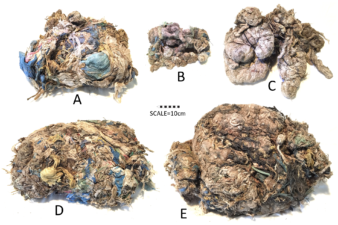The growing threat of plastic pollution in the world’s seas and oceans has been a great concern for marine environmentalists and oceanographers. These include Dr. Sylvia Earle, a world famous American oceanographer and marine biologist as well as an undersea explorer. Dr. Earle has spent much of her life conducting research and exploration of the marine environment in the world’s oceans.
Coinciding with the plastic pollution theme of this year’s Earth Day 2018, Dr. Earle speaks widely about the large amounts of plastic waste material now found in the oceans. Dr. Earle, 82, has devoted more than 65 years studying and photographing ocean marine life. Earle told CNN recently that since 2014, as much as 5 trillion pieces of plastic material, much of it single use “throwaway” plastic bags and bottles are floating in the world’s oceans. She added that as much as 8 million tons of plastic material enters the oceans annually; a large part of it being single use plastic items that are discarded on beaches by people who are simply ignorant of the dangers this material is to marine life.
One of more tragic examples of marine plastic pollution can be seen on the beaches and in the waters surrounding the mid-Pacific Midway Island atoll, home to large numbers of albatross and other sea birds. Stomachs of dead marine birds collected on the beaches of the atoll have been found to contain large amounts of plastic material; including such items as plastic bottle caps, pull-off bottle top rings and other material.
The birds ingest this plastic material, thinking it to be food. Eventually, the birds’ stomachs become full of this material (photo), that dooms them to die. “The oceans are the basis for our life support; and plastic material becomes part of the food chain. Humans are responsible for this plastic epidemic,” says Dr. Earle, adding that single use plastic material, discarded by people, is a big component.

It takes between 500 and 1,000 years for plastic material to break down organically. This means that such material can literally float around in the oceans for centuries. “Plastics themselves are not the problem – humans are” Earle says. One ray of hope to rid the oceans of such material, deals with a plastic eating enzyme, discovered by scientists, that appears to literally eat plastic bottles and other material. Other ideas include use of giant sieves to trap and scoop up this material in the seas. The giant sieve idea for trapping small plastic particles was conceived by Boyan Slat of the Netherlands in 2013. Slat’s project, The Ocean Cleanup, won the Katervera Award, the environmental equivalent of the Nobel Prize for Sustainability in 2016.

There’s still a lot to be done for even making a small dent in cleaning up the massive plastic amounts in the world’s oceans. Even concerted efforts on behalf of world bodies will have a hard time cleaning up the waste material of “floating garbage patches” found in areas like the Great North Pacific Gyre. But a start has to be made, including greater efforts to educate people about the dangers of throwaway plastic bags and bottles that wind up being washed out to sea.
More about the dangers of plastic pollution and other marine environmental issues:
CNN: The sixth mass extinction has arrived
The ocean cleanup wins Katervera – the Nobel prize for sustainability
Why Dolphins have disappeared from Israel’s shores
Photo of ocean plastic pollution: One Green Planet;Photo of plastics found in bird stomach by Jackson Loo/CNN




